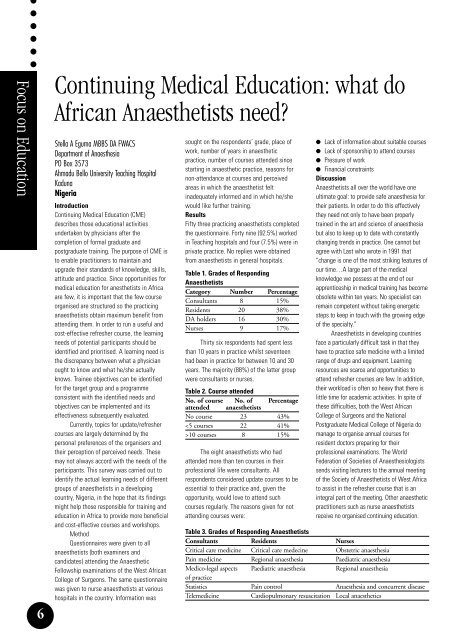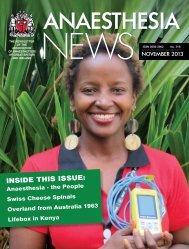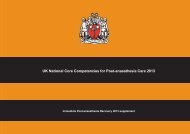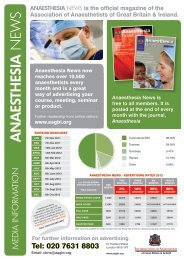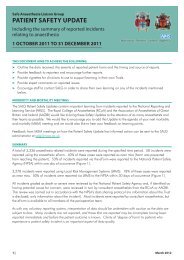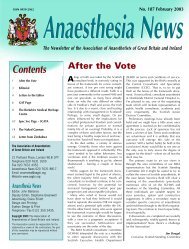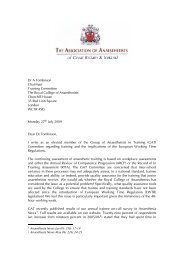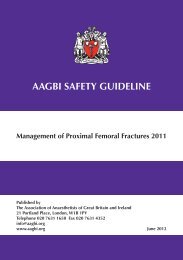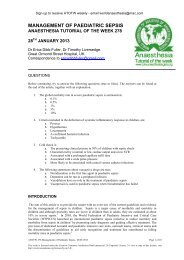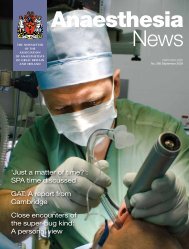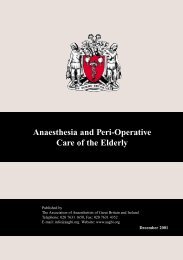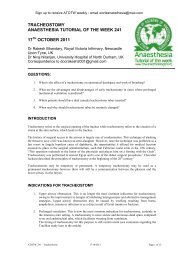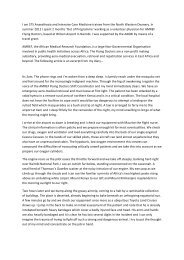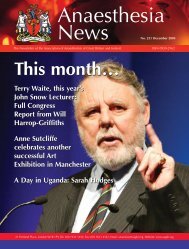Download pdf - aagbi
Download pdf - aagbi
Download pdf - aagbi
Create successful ePaper yourself
Turn your PDF publications into a flip-book with our unique Google optimized e-Paper software.
Focus on Education<br />
6<br />
Continuing Medical Education: what do<br />
African Anaesthetists need?<br />
Stella A Eguma MBBS DA FWACS<br />
Department of Anaesthesia<br />
PO Box 3573<br />
Ahmadu Bello University Teaching Hospital<br />
Kaduna<br />
Nigeria<br />
Introduction<br />
Continuing Medical Education (CME)<br />
describes those educational activities<br />
undertaken by physicians after the<br />
completion of formal graduate and<br />
postgraduate training. The purpose of CME is<br />
to enable practitioners to maintain and<br />
upgrade their standards of knowledge, skills,<br />
attitude and practice. Since opportunities for<br />
medical education for anesthetists in Africa<br />
are few, it is important that the few course<br />
organised are structured so the practicing<br />
anaesthetists obtain maximum benefit from<br />
attending them. In order to run a useful and<br />
cost-effective refresher course, the learning<br />
needs of potential participants should be<br />
identified and prioritised. A learning need is<br />
the discrepancy between what a physician<br />
ought to know and what he/she actually<br />
knows. Trainee objectives can be identified<br />
for the target group and a programme<br />
consistent with the identified needs and<br />
objectives can be implemented and its<br />
effectiveness subsequently evaluated.<br />
Currently, topics for update/refresher<br />
courses are largely determined by the<br />
personal preferences of the organisers and<br />
their perception of perceived needs. These<br />
may not always accord with the needs of the<br />
participants. This survey was carried out to<br />
identify the actual learning needs of different<br />
groups of anaesthetists in a developing<br />
country, Nigeria, in the hope that its findings<br />
might help those responsible for training and<br />
education in Africa to provide more beneficial<br />
and cost-effective courses and workshops.<br />
Method<br />
Questionnaires were given to all<br />
anaesthetists (both examiners and<br />
candidates) attending the Anaesthetic<br />
Fellowship examinations of the West African<br />
College of Surgeons. The same questionnaire<br />
was given to nurse anaesthetists at various<br />
hospitals in the country. Information was<br />
sought on the respondents’ grade, place of<br />
work, number of years in anaesthetic<br />
practice, number of courses attended since<br />
starting in anaesthetic practice, reasons for<br />
non-attendance at courses and perceived<br />
areas in which the anaesthetist felt<br />
inadequately informed and in which he/she<br />
would like further training.<br />
Results<br />
Fifty three practicing anaesthetists completed<br />
the questionnaire. Forty nine (92.5%) worked<br />
in Teaching hospitals and four (7.5%) were in<br />
private practice. No replies were obtained<br />
from anaesthetists in general hospitals.<br />
Table 1. Grades of Responding<br />
Anaesthetists<br />
Category Number Percentage<br />
Consultants 8 15%<br />
Residents 20 38%<br />
DA holders 16 30%<br />
Nurses 9 17%<br />
Thirty six respondents had spent less<br />
than 10 years in practice whilst seventeen<br />
had been in practice for between 10 and 30<br />
years. The majority (88%) of the latter group<br />
were consultants or nurses.<br />
Table 2. Course attended<br />
No. of course No. of Percentage<br />
attended anaesthetists<br />
No course 23 43%<br />
10 courses 8 15%<br />
The eight anaesthetists who had<br />
attended more than ten courses in their<br />
professional life were consultants. All<br />
respondents considered update courses to be<br />
essential to their practice and, given the<br />
opportunity, would love to attend such<br />
courses regularly. The reasons given for not<br />
attending courses were:<br />
● Lack of information about suitable courses<br />
● Lack of sponsorship to attend courses<br />
● Pressure of work<br />
● Financial constraints<br />
Discussion<br />
Anaesthetists all over the world have one<br />
ultimate goal: to provide safe anaesthesia for<br />
their patients. In order to do this effectively<br />
they need not only to have been properly<br />
trained in the art and science of anaesthesia<br />
but also to keep up to date with constantly<br />
changing trends in practice. One cannot but<br />
agree with Last who wrote in 1991 that<br />
“change is one of the most striking features of<br />
our time…A large part of the medical<br />
knowledge we possess at the end of our<br />
apprenticeship in medical training has become<br />
obsolete within ten years. No specialist can<br />
remain competent without taking energetic<br />
steps to keep in touch with the growing edge<br />
of the specialty.”<br />
Anaesthetists in developing countries<br />
face a particularly difficult task in that they<br />
have to practice safe medicine with a limited<br />
range of drugs and equipment. Learning<br />
resources are scarce and opportunities to<br />
attend refresher courses are few. In addition,<br />
their workload is often so heavy that there is<br />
little time for academic activities. In spite of<br />
these difficulties, both the West African<br />
College of Surgeons and the National<br />
Postgraduate Medical College of Nigeria do<br />
manage to organise annual courses for<br />
resident doctors preparing for their<br />
professional examinations. The World<br />
Federation of Societies of Anaesthesiologists<br />
sends visiting lecturers to the annual meeting<br />
of the Society of Anaesthetists of West Africa<br />
to assist in the refresher course that is an<br />
integral part of the meeting. Other anaesthetic<br />
practitioners such as nurse anaesthetists<br />
receive no organised continuing education.<br />
Table 3. Grades of Responding Anaesthetists<br />
Consultants Residents Nurses<br />
Critical care medicine Critical care medecine Obstetric anaesthesia<br />
Pain medicine Regional anaesthesia Paediatric anaesthesia<br />
Medico-legal aspects Paediatric anaesthesia Regional anaesthesia<br />
of practice<br />
Statistics Pain control Anaesthesia and concurrent disease<br />
Telemedicine Cardiopulmonary resuscitation Local anaesthetics


